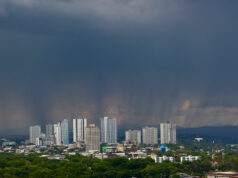When the US gave its less than gracious reaction to the United Nations last December, many people raised a collective eyebrow. The truth is, viewed from the Philippine perspective, one should be perplexed too if asked whether staying in the UN is somehow still in the national interest.
For the US, the issue started with President Trump’s decision to move his country’s embassy to Jerusalem; thus signaling the US alignment with Israel’s position that said city is the latter’s capital.
Now, the choosing of the embassy’s location and determining what is the nation’s capital should be any State’s free sovereign decision. Apparently, not for the US (and — for that matter — Israel).
Hence, President Donald Trump “threatened to withhold ‘billions’ of dollars of US aid from countries which vote in favor of a United Nations resolution rejecting the US president’s recognition of Jerusalem as the capital of Israel. (http://bit.ly/defianttrump, The Guardian, December 2017)
His comments came after the US ambassador to the UN, Nikki Haley, wrote to about 180 of 193 member states warning that she will be “taking names” of countries that vote for a general assembly resolution on Thursday critical of the announcement which overturned decades of US foreign policy.” (http://bit.ly/uswill, The Guardian, December 2017)
Of course, what a country does with its own money is its own business as well. But again, not so apparently as far as the US is concerned.
Which leads me to the Philippines and its unfailing trust in the international community, international law, and the UN. Such trust, however, needs reexamination.
There was the 2014 Golan Heights incident, where a bunch of al Qaeda terrorists violated a cease-fire line and captured 45 Fijian solders serving as UN peacekeepers.
When a nearby Philippine contingent was surrounded by the same terrorists, a UN commander demanded that the Filipinos not defend themselves and surrender if need be. Our soldiers rightly ignored this ridiculous order. Obeying their Philippine commanders instead, they fought back for a solid three straight days, killing some terrorists, and made a daring escape to Israel.
The UN commander, General Iqbal Singh Singha of India, was livid: calling our soldiers unprofessional and cowards. When the Fijian hostages were later released, General Singha changed his tune. An apology, never given, was clearly more appropriate. The UN stayed silent.
Then there was the arbitral ruling against China.
Contrary to the declarations of many a local supposed international relations experts that the case filed (and subsequent victory) by the Philippines will lead to overwhelming heartwarming support from other countries and encourage other parties to prosecute succeeding suits against China, reality conspired to make us hit a brick wall.
As far as can be determined, around 70 countries (according to The Diplomat’s Wang Wen and Chen Xiaochen; July 2016) “endorse China’s position in various angles xxx and they did so in various ways: unilaterally, bilaterally, or multilaterally. All of them welcome peaceful negotiations to settle the disputes. In addition, we should bear in mind that Philippines’ ex-parte arbitration violates its own commitment to peaceful dialogue and negotiation. Among these countries, some expressed their public and firm support for China’s stance of non-acceptance of the arbitration.”
Again where was UN support for the Philippines?
Add to this the UN’s continued assault on our values, particularly its promotion of abortion, which goes against our family oriented Constitution.
Much has been made of so-called UN assistance to our country: food donations to children, agriculture support, support for those affected by typhoons and disaster response, health, and education (including the construction of primary and high school buildings). There was also the UN’s recognition of our jurisdiction over Benham Rise.
But then this must be considered: we are not as mendicantly dependent on the UN as sometimes made out to be.
We contribute (quite conscientiously) to the UN’s annual upkeep, which for this 2018 (paid last Jan. 26) amounted to $4,010,667 (or roughly P200,000,000). To get a scale of how big that is, note that it constitutes almost a third of the Commission of Human Rights budget and almost the increase given to the Civil Service Commission for 2018.
Add to this our tireless support to the UN’s peacekeeping missions (per Wiki in 2014, “the Philippines is regarded as one of the most active countries in the Asia and Pacific region in terms of peace support troop contribution — the 4th among ASEAN members states, and 60th worldwide).
Besides, the UN (specifically, the UN Commission on the Limits of the Continental Shelf) did not grant us Benham Rise — it merely recognized our claim. That continental shelf has always been ours jurisdictionally per international law.
I don’t know what is being taught to our kids but the fact is, the Philippines remains a sovereign country, deserving neither interference, dictation, or condescension from any one.
There is also no such thing as a world government. And even if there is, the UN — as it is today — is far from being it.
Jemy Gatdula is a Senior Fellow of the Philippine Council for Foreign Relations and a Philippine Judicial Academy law lecturer for constitutional philosophy and jurisprudence.
Twitter @jemygatdula



